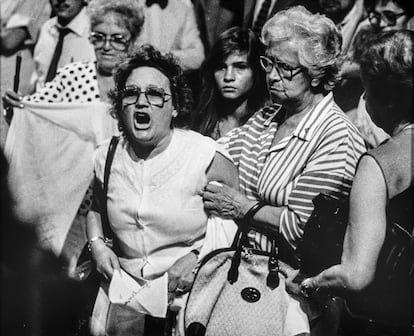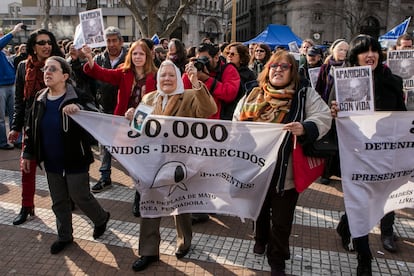
The Argentine Nora Morales de Cortiñas didn’t forestall looking for a unmarried day of her existence for her eldest son, Gustavo, who disappeared because of state terrorism on April 15, 1977. Norita, as she was once recognized in Argentina the president of Madres de Mayo-Founding Line, died this Thursday on the age of 94 with out being discovered. She requested about him at the side of different moms in authentic workplaces and police stations right through the dictatorship. Later, now in democracy, she seemed earlier than Justice to take a look at with out good fortune to search out solutions from the warriors sitting within the dock. She by no means even controlled to determine the place they’d him abducted and what they did with him. However that lady of tiny stature and immense smile at all times carried Gustavo’s symbol on her chest. She was once her means of remembering him and likewise of vindicating the reminiscence of the Argentine other folks about some of the darkest pages in her historical past.
Cortiñas underwent surgical procedure for a hernia closing week and remained in extensive maintain days. “Fuerza Norita!” Mentioned the hundreds of messages that flooded the networks whilst this social psychologist and instructor fought for her existence. She died on a Thursday, that day that for 47 years she has been the mounted appointment of the entire Moms of Plaza de Mayo to grow to be her ache right into a collective combat that has long past world wide.
“When I used to be a bit of lady I dreamed of princesses, I dreamed of taking my youngsters to the carousel. She was once no longer a modern like now. My title is Nora Morales de Cortiñas, however we all know me as Norita”, this tireless fighter, found in any mobilization the place human rights have been attacked, favored to introduce herself to the brand new generations.
She was once born in Buenos Aires, in 1930, because the 3rd daughter of a center elegance circle of relatives. “She was once humorous, very pizpireta, kind Mafalda. They are saying she had a good time outings,” she described herself when remembering that glad second in her existence within the biography. Norita, the mummy of all battles that Gerardo Szalkowicz wrote. At 19 she married her first and best boyfriend, Carlos Cortiñas, and shortly her two sons arrived: Gustavo and Marcelo. Despite the fact that she had studied the industry of a designer, her biggest aspiration within the following a long time was once to be “an ideal housewife,” like such a lot of different Argentine ladies.
His existence took a 180 stage flip the day Gustavo disappeared. He left that home international that he ruled and made his means into some other unknown one, ruled through an atrocious dictatorship. Just a yr had handed for the reason that coup d’état and the army was once kidnapping dozens of other folks an afternoon, as a part of a scientific extermination plan that she and different moms stood as much as with out considering: the lives in their youngsters have been at stake.

“They referred to as me at my area, they threatened me, they painted all the community with the title “terrorist mom,” he recalled when speaking concerning the first Thursdays by which the Moms met within the Plaza de Mayo, in entrance of the headquarters of the Argentine Govt. . Given the prohibition to stick nonetheless, they started to circle across the Pyramid to call for the semblance in their youngsters. Cortiñas maintained the ritual till the top of her existence. He went to the Plaza de Mayo each Thursday, excluding for the ones when go back and forth or sickness averted him. The one extended parenthesis have been the months of pressured confinement of the pandemic.
Feminist dedication
In the ones marches, she at all times wore on her head the white shawl that the Moms of Plaza de Mayo changed into an international image in opposition to the dictatorship. “The white handkerchief fights in opposition to injustice, in opposition to silence, in opposition to oblivion,” Cortiñas outlined it. In recent times, she started to tie some other one round her wrist, which she regarded as the inheritor to that custom of combat of Argentine ladies: the golf green shawl that feminists held up. in desire of prison, secure and loose abortion.
When Argentina regained democracy in 1983, Cortiñas was once enthusiastic about the potential for seeing the army convicted of crimes in opposition to humanity. “The trial of the Juntas took us out of the uncertainty that there was once by no means going to be justice,” summarized Nora Cortiñas when talking concerning the historical judicial procedure that happened in 1984.

Two years later, then again, interior divisions led Cortiñas to distance herself from the top of the Madres de Plaza de Mayo staff, Hebe de Bonafini, and create some other extra horizontal and no more dogmatic group: Madres de Plaza de Mayo – Línea Foundress. Its contributors, like Cortiñas, agreed to testify earlier than the Nationwide Fee on Disappearance of Individuals (Conadep), authorized the exhumation of corpses buried as NN and the reparation measures presented through the Argentine State, amongst different variations.
Proprietor of unbelievable power, Cortiñas supported a lot of reasons each outside and inside Argentina. “That absence, that ache that I believe each day, is the motive force of my dedication. This is the reason I’m far and wide accompanying the struggles in opposition to all oppressions; as a result of, merely, I need to alternate this unjust international,” argued that courageous lady, when he was once already strolling with the assistance of a canewhen requested the place she were given her power from.
His closing public look happened on March 24, when he marched to commemorate the anniversary of the closing coup d’état and shouted “By no means Once more” along a crowd nervous about the upward thrust of speeches challenging state terrorism from the ones across the Argentine president Javier Milei. Even then she did not decrease her hands. He invited younger other folks to stay the reminiscence and the struggle in opposition to injustice alive. “In a few years I want to be remembered with a grin and with that cry that implies the whole thing I believe inside of me: We will be able to win!” she expressed. A logo of unwavering resistance, Cortiñas knew how one can create a bridge between reminiscence and utopia.










